2016 Class of Fellows
Established in 1989 for advanced individual technological contributions in the field of electrochemical and solid state science and technology. These members are being recognized at the Plenary for contributions to the advancement of science and technology, for leadership in electrochemical and solid state science and technology, and for active participation in the affairs of ECS.
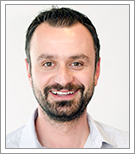 Nick Birbilis is currently the Woodside Innovation Chair at Monash University, where he is also the head of the Department of Materials Science and Engineering. His research focuses on understanding and control of corrosion of metals involved in applied projects spanning aerospace, biomedical, infrastructure, automotive, and defense. Nick Birbilis is currently the Woodside Innovation Chair at Monash University, where he is also the head of the Department of Materials Science and Engineering. His research focuses on understanding and control of corrosion of metals involved in applied projects spanning aerospace, biomedical, infrastructure, automotive, and defense.
Throughout his research, Birbilis has made major contributions in the areas of aluminum and magnesium alloys (the light metals). More recently he has made several key contributions in elucidating the electrochemistry of magnesium, which is of important relevance in the context of light weighting, electrodes and energy applications.
Birbilis has authored over 200 publications and is currently an Associate Editor for the journal Electrochimica Acta and Editor-in-Chief of Materials Degradation. He is also a Fellow of the National Association of Corrosion Engineers (NACE).
|
 Bryan A. Chin began his scientific career at Westinghouse Hanford Company where he worked on the development of sensors and instrumentation for monitoring nuclear reactor cores. He then took that expertise to Auburn University, where he is in his 36th year of service and currently serves as The Breeden Professor of Engineering and Chairman of Materials of Engineering. Additionally, Chin is the Founder and Director of the Auburn University Detection and Food Safety Center. Bryan A. Chin began his scientific career at Westinghouse Hanford Company where he worked on the development of sensors and instrumentation for monitoring nuclear reactor cores. He then took that expertise to Auburn University, where he is in his 36th year of service and currently serves as The Breeden Professor of Engineering and Chairman of Materials of Engineering. Additionally, Chin is the Founder and Director of the Auburn University Detection and Food Safety Center.
Chin’s current research interests include electrochemical sensors for food safety, quality, and security; agricultural production and processing; environmental monitoring and the detection of pesticide residuals; and medical applications.
He has served as Secretary, Vice Chair, and Chair of the ECS Sensor Division and has organized and led many of the division’s symposia. Chin has authored or co-authored more than 280 publications and has been recognized for his work by organizations such as the Chinese Academy of Sciences and the Russian Academy of Engineering Science.
|
 Jeffrey W. Fergus is a professor of material engineering and Associate Dean for Program Assessment and Graduate Studies in the Samuel Ginn College of Engineering at Auburn University. His current research interests are in materials for high temperature and electrochemical applications. Fergus’ work has applications in the development of chemical sensors for gases, such as carbon dioxide and water vapor; and constituents in molten metals, as in dissolved gasses and alloying elements. Jeffrey W. Fergus is a professor of material engineering and Associate Dean for Program Assessment and Graduate Studies in the Samuel Ginn College of Engineering at Auburn University. His current research interests are in materials for high temperature and electrochemical applications. Fergus’ work has applications in the development of chemical sensors for gases, such as carbon dioxide and water vapor; and constituents in molten metals, as in dissolved gasses and alloying elements.
Additionally, Fergus has worked on materials for energy conversion and storage applications, including batteries, fuel cells, thermoelectric generators, and gas turbine engines. He is particularly interested in understanding and mitigating performance degradation, such as chromium poisoning in SOFCs and capacity fading in Li-ion batteries.
Fergus has been involved in ECS through organizing symposia and serving on various committees. This includes leadership roles within the High Temperature Materials Division, the Education Committee and the Georgia Section, as well as in establishing the Auburn University Student Chapter. He currently serves as the Editor of ECS Transactions.
|
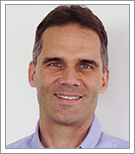 Jürgen Fleig is currently a professor at Technische Universität Wien. Prior to joining the university, Fleig was a scientist at Max Planck Institute of Solid State Research. His research efforts have focused on defects, ion motion and electrochemical reactions in solids, with emphasis on materials used in energy technology (fuel cells) and dielectrics or piezoelectrics. Jürgen Fleig is currently a professor at Technische Universität Wien. Prior to joining the university, Fleig was a scientist at Max Planck Institute of Solid State Research. His research efforts have focused on defects, ion motion and electrochemical reactions in solids, with emphasis on materials used in energy technology (fuel cells) and dielectrics or piezoelectrics.
His work has led to the development of novel experimental tools for investigating ionic solids and fundamental contributions to the basic interpretation of impedance spectra in solid state systems and in understanding the kinetics of electrochemical reactions at gas/solid interfaces.
Fleig has been recognized by the American Ceramic Society, International Society of Electrochemistry, and the Aventis Foundation. He has served on the editorial boards of several scientific journals and co-organized a number of symposia and conferences in the field of solid state ionics and solid state electrochemistry.
|
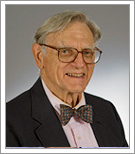 John Bannister Goodenough was born in 1922, served in WWII, and obtained his PhD in physics from the University of Chicago (1952). Throughout his career, Goodenough established himself as an internationally prominent solid state scientist, widely recognized for his role in the development of the rechargeable Li-ion battery. John Bannister Goodenough was born in 1922, served in WWII, and obtained his PhD in physics from the University of Chicago (1952). Throughout his career, Goodenough established himself as an internationally prominent solid state scientist, widely recognized for his role in the development of the rechargeable Li-ion battery.
Currently, he holds the Virginia H. Cockrell Centennial Chair of Engineering at the University of Texas at Austin, where he studies orbital ordering and crossover from localized to itinerant d electrons in solids and continues with development of components for electrochemical technologies.
Goodenough is a member of the U.S. National Academies of Science and Engineering, as well as a foreign member of the Royal Society, England, and the National Societies of France, Spain, and India. Among other awards, he has received the Japan Prize (2001), the Presidential Enrico Fermi Award (2009), the National Medal of Science (2012), and the Stark Draper Prize of the National Academy of Engineering (2014).
|
 A. Robert Hillman has over 30 years of experience in the fields of electrochemistry and interfacial science. Within these fields, his research interests can be divided into the areas of interfacial characterisation, electroactive materials, thin films and the development of non-electrochemical techniques for surface analysis. A. Robert Hillman has over 30 years of experience in the fields of electrochemistry and interfacial science. Within these fields, his research interests can be divided into the areas of interfacial characterisation, electroactive materials, thin films and the development of non-electrochemical techniques for surface analysis.
Hillman is currently a professor at the University of Leicester. His research interests are in the field of interfacial electrochemistry, with particular focus on new materials and their use in surface modification. This involves development and application of in situ characterization techniques, including spectroscopies (from the X-ray to the infra-red region), optical and neutron reflectivity, and acoustic wave methods. The underlying goal is elucidation of molecular explanations – composition, structure and dynamics – for observed macroscopic interfacial behavior.
Throughout his career, Hillman has been involved with many scientific societies. He has served the International Society of Electrochemistry in a number of roles, from UK National Secretary (1994-1998), Secretary General (1999-2005), Chair of the Scientific Meetings Committee (2006-07) to President (2009-2010).
|
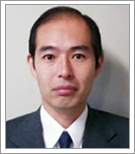 Hiroshi Imahori is a professor at Kyoto University and a principal investigator at the university’s Institute for Integrated Cell-Material Sciences. His current research interests include artificial photosynthesis, organic photovoltaics, organic functional materials, and drug delivery systems. Hiroshi Imahori is a professor at Kyoto University and a principal investigator at the university’s Institute for Integrated Cell-Material Sciences. His current research interests include artificial photosynthesis, organic photovoltaics, organic functional materials, and drug delivery systems.
For his work, he has received the Japanese Photochemistry Association Prize (2004), Japan Society for the Promotion of Science Prize (2006), the Chemical Society of Japan Award for Creative Work (2006), the Tokyo Techno Forum 21 Gold Medal Prize (2007), the Osaka Science Prize (2007), and Japan National Institute of Science and Technology Policy Research Award (2007).
To date, Imahori has written more than 280 original papers and 30 review articles. He has been actively involved in ECS affairs since 1996 and is currently Vice Chair of the Nanocarbons Division. He was a member of Advisory Board of ChemSusChem (2007-2015) and The Journal of Physical Chemistry (2009–2011). He is a Deputy Editor-in-Chief of the Journal of Materials Chemistry A and a member of the Advisory Board of Materials Horizon and Applied Materials Today.
|
 Ram S. Katiyar is currently a Professor of Physics at the University of Puerto Rico, San Juan, where he has single-handedly established an Advanced Materials Research Laboratory – also known as SPECLAB -- for synthesizing nano-structured materials/films utilizing sol-gel, pulse laser deposition, and RF sputtering techniques; and characterizing them using Raman spectroscopy, x-ray diffraction, dielectric studies, and other non-spectroscopic techniques (electrical, magnetic, calorimetry, and surface microscopy). Ram S. Katiyar is currently a Professor of Physics at the University of Puerto Rico, San Juan, where he has single-handedly established an Advanced Materials Research Laboratory – also known as SPECLAB -- for synthesizing nano-structured materials/films utilizing sol-gel, pulse laser deposition, and RF sputtering techniques; and characterizing them using Raman spectroscopy, x-ray diffraction, dielectric studies, and other non-spectroscopic techniques (electrical, magnetic, calorimetry, and surface microscopy).
Among his most notable research, Katiyar has successfully designed a few novel room temperature multiferroics with magnetoelectric switching at small magnetic fields (< 1 Tesla) and having large magnetoelectric coefficients that may have commercial potential in nonvolatile memories and sensor applications.
His immense contributions in the field are represented by his excellent publication record (over 900 articles) in reviewed scientific journals. He was awarded American Physical Society Fellow (2009) and Materials Research Society Fellow (2013), as recognition for his contributions in the area of applied materials science, especially in growth and characterization of ferroelectric thin films.
|
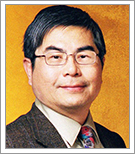 Bor Yann Liaw is the Manager of the Energy Storage and Advanced Vehicles Department at Idaho National Laboratory (INL). There, he oversees an R&D program on batteries and advanced vehicle evaluations. Prior to INL, Liaw held a position at the Hawaii Natural Energy Institute, where he focused on advanced power source systems for vehicle and energy storage applications. Bor Yann Liaw is the Manager of the Energy Storage and Advanced Vehicles Department at Idaho National Laboratory (INL). There, he oversees an R&D program on batteries and advanced vehicle evaluations. Prior to INL, Liaw held a position at the Hawaii Natural Energy Institute, where he focused on advanced power source systems for vehicle and energy storage applications.
Liaw has been in the field of electric and hybrid vehicle evaluation and advanced battery diagnostics and prognostics for the past three decades. His major research activities comprise laboratory and real-life battery and vehicle testing, data collection and analysis, battery modeling and simulation, battery performance and life prediction, battery rapid charging technology development, and battery diagnoses and prognoses.
Over the past two decades, Liaw has been involved in many professional organizations, including: ECS, International Society of Solid State Ionics, and the International Battery Association. He has co-authored more than 150 technical papers, seven book chapters, and eight patents and patent applications. He is currently the Associate Editor for the Journal of The Electrochemical Society.
|
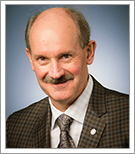 Peter Mascher is the William Sinclair Chair of Optoelectronics and Associate Vice-President, International Affairs at McMaster University. He leads active research groups involved in the fabrication and characterization of thin films for optoelectronic applications, the development and application of silicon-based nanostructures, and the characterization of defects in solids by positron annihilation spectroscopy. Peter Mascher is the William Sinclair Chair of Optoelectronics and Associate Vice-President, International Affairs at McMaster University. He leads active research groups involved in the fabrication and characterization of thin films for optoelectronic applications, the development and application of silicon-based nanostructures, and the characterization of defects in solids by positron annihilation spectroscopy.
Mascher’s work has been continuously funded for more than 26 years by the Natural Sciences and Engineering Research Council of Canada, the Canada Foundation of Innovation, several federal and provincial Centres of Excellence, and industry.
Mascher has supervised more than 60 PhD and Master’s students, has authored or co-authored close to 250 publications in refereed journals and conference proceedings, and has presented many invited lectures at international conferences and workshops. He is a member of the governing body of the Dielectric Science and Technology Division of ECS, and currently serves as the Vice Chair of Nano Ontario.
|
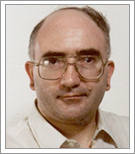 Eddy Simoen is a Senior Researcher at IMEC, where he is currently involved in the study of defect and strain engineering in high-mobility and exitaxial substrates and defect studies in germanium and III-V compounds. Eddy Simoen is a Senior Researcher at IMEC, where he is currently involved in the study of defect and strain engineering in high-mobility and exitaxial substrates and defect studies in germanium and III-V compounds.
His research interests cover the field of device physics and defect engineering in general, with particular emphasis on the study of low-frequency noise, low-temperature behavior and of radiation defects in semiconductor components and materials. In 2013, he was nominated part-time professor at the Ghent University in the study on the impact of defects on semiconductor devices. Since 2013 he also holds a Visiting Professor position at the Institute of Microelectronics in Beijing.
In these fields, he has either authored or co-authored over 1,500 journal and conference papers, and 12 book chapters. Additionally, Simoen has organized many workshops and symposia. He is the lead organizer of the biannual High Purity Silicon Symposium at ECS meetings.
|
 Masahiro Watanabe started his research and teaching careers at Yamanashi University in 1968, where he constructed the Clean Energy Research Center and the Fuel Cell Nanomaterials Center. Masahiro Watanabe started his research and teaching careers at Yamanashi University in 1968, where he constructed the Clean Energy Research Center and the Fuel Cell Nanomaterials Center.
Throughout his career, his work has focused on the most important and essential subjects for DMFC, PEFC, PAFC, SOFC and H2 production/purification from the viewpoints of the basic science and the applications. He has published his findings in over 350 journal articles and has obtained over 100 patents, proposing several novel concepts in bimetallic alloy catalysts such for fuel cell anodes and cathodes, which are now being used in commercialized co-generation systems and fuel cell vehicles.
Among his honors, Watanabe has been awarded the Achievement Prize from Electrochemical Society of Japan, the Catalysis Society of Japan Award, Japan Ministry of Education, Culture, Sports, Science and Technology (MEXT) Award, the International Partnership for the Hydrogen Economy Technical Achievement Award, and more.
|
 Alan West joined the staff at Columbia University in 1992, where he is currently the Chair of the Department of Chemical Engineering and the Samuel Ruben-Peter G. Biele Professor of Electrochemistry. His research interests include electrodeposition, electrochemical sensors, batteries, and electrochemical synthesis. In addition to his academic studies, West has consulted and collaborated extensively within the industry. Alan West joined the staff at Columbia University in 1992, where he is currently the Chair of the Department of Chemical Engineering and the Samuel Ruben-Peter G. Biele Professor of Electrochemistry. His research interests include electrodeposition, electrochemical sensors, batteries, and electrochemical synthesis. In addition to his academic studies, West has consulted and collaborated extensively within the industry.
Previously, West studied under John Newman at the University of California, Berkeley, where he focused on the numerical simulation and theory of current distributions. He completed his postdoctoral studies at the École Polytechnique Fédérale de Lausanne, where his research focused on the electrochemical etching and polishing of metals.
He has received the ECS Norman Hackerman Young Author Award, as well as the Society’s Electrodeposition Division Research Award. He is an author of a self-published text titled Electrochemistry and Electrochemical Engineering: An Introduction which is intended for engineering students at the advanced undergraduate or beginning graduate level.
|
|
 |
 |
Registration
- - - - - - - - - - - - - - - - - - - - -
Meeting Program
- - - - - - - - - - - - - - - - - - - - -
Important Dates
Abstract Deadline
April 15, 2016
Registration Now Open!
Travel Grants
June 10, 2016
Exhibit & Sponsorships
June 15, 2016
Early-Bird Ends
September 2, 2016
|
|
 |
|